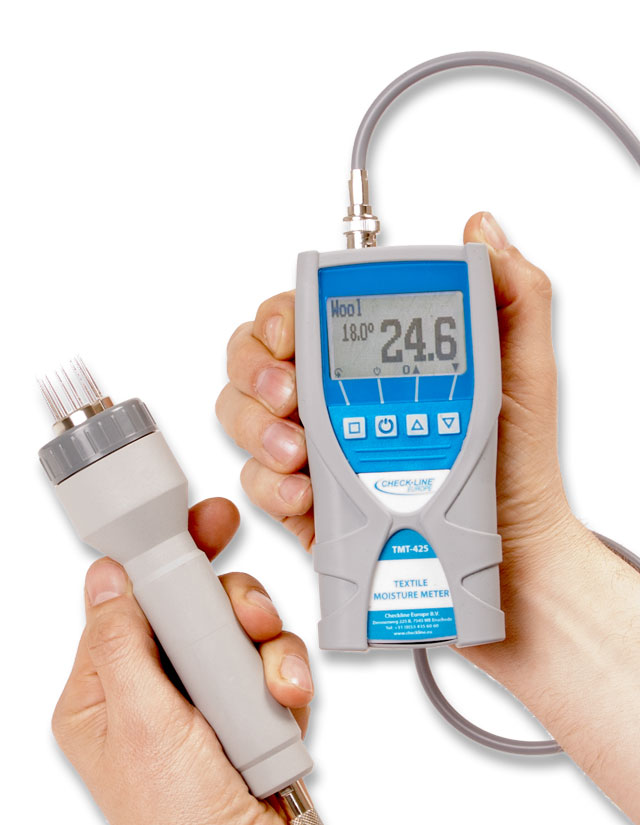Moisture Meter Reviews: Contrasting the most effective Designs for Specialist and DIY Usage
Wiki Article
The Ultimate Guide to Moisture Meters: A Comprehensive Summary and Just How They Can Save You Money
Moisture meters serve as essential devices in spotting and keeping track of moisture material in materials, assisting in stopping expensive damages and ensuring the top quality of items. Recognizing the nuances of different kinds of dampness meters, their applications, and the potential cost-saving advantages they offer can be a game-changer for specialists and services alike.Kinds Of Moisture Meters
Numerous kinds of dampness meters are available for various applications in different industries. One typical kind is the pin-type wetness meter, which determines the electric resistance in between two pins placed into a product. This type is suitable for wood, drywall, and various other structure products. Pinless moisture meters, on the various other hand, usage electromagnetic sensing unit plates to check a larger location without creating damage to the material's surface area. Moisture Meter. These meters are excellent for quickly examining moisture levels in huge locations such as floorings and wall surfaces.
In addition, there are additionally specialized dampness meters created for specific products like hay, soil, or grain. These meters provide accurate wetness analyses tailored to the special buildings of the material being tested. Infrared moisture meters gauge the thermal homes of a material to establish its moisture material non-invasively, making them valuable for applications where pin or pinless meters may not appropriate. Comprehending the various kinds of moisture meters offered can aid markets pick the most appropriate tool for their specific moisture measurement demands.

Benefits of Using Dampness Meters
Wetness meters offer important benefits in precisely monitoring and analyzing moisture degrees in varied materials and settings (Moisture Meter). Among the key benefits of using wetness meters is the prevention of potential damages brought on by excess moisture. By discovering and resolving high moisture degrees beforehand, dampness meters assist to stop mold growth, rot, and architectural damages in structures, saving both time and money on fixings. Additionally, wetness meters help in ensuring the top quality of materials throughout construction or production procedures. By accurately gauging wetness content, these devices help keep the honesty of wood, drywall, concrete, and various other products, lowering the threat of problems or failures.
Furthermore, utilizing moisture meters can lead to enhanced power efficiency. By determining locations with high dampness degrees, such as leaks or poor insulation, modifications can be made to boost energy preservation and reduce utility costs. In farming settings, wetness meters play a crucial duty in enhancing crop yields by making it possible for farmers to check dirt dampness degrees and make educated irrigation decisions. Overall, the benefits of making use of dampness meters span across various markets, offering cost-effective remedies and promoting far better quality assurance methods.
Exactly How to Pick the Right Wetness Meter
When choosing a moisture meter, it's crucial to make sure that the meter is ideal for the particular material you will certainly be testing. Different Home Page products have differing electrical residential or commercial properties that can affect moisture readings, so choosing a meter developed for your product is important for accurate results. By carefully examining these elements, you can choose a wetness meter that meets your demands and supplies accurate wetness dimensions for your tasks.Correct Methods for Wetness Meter Use

Price Cost Savings Through Moisture Meter Applications
Just how can the calculated use of dampness meters lead to substantial expense savings throughout numerous markets? In the agriculture market, dampness meters help in determining the optimum time for gathering crops, stopping excess or over-drying wetness that can affect the final product's top quality.
In a similar that site way, in building and construction, moisture meters help protect against pricey problems by spotting dampness levels in building materials, such as timber or concrete, which can bring about architectural problems otherwise resolved without delay. By recognizing issue locations early on, service providers can take corrective measures to stay clear of substantial repair services or substitutes, eventually conserving money and time.
Moreover, in the food processing industry, moisture meters are important for keeping an eye on item top quality and guaranteeing compliance with security policies. By precisely measuring moisture material in foodstuff, manufacturers can prevent spoilage, preserve freshness, and reduce waste, leading to significant expense savings. In general, the tactical application of moisture meters is a beneficial investment that can result in significant expense decreases and boosted performance across various industries.
Conclusion
In final thought, moisture meters are valuable tools for gauging and finding wetness degrees in different products. By utilizing the discover this right dampness meter and adhering to proper strategies, individuals can effectively prevent costly problems caused by excess moisture.Wetness meters offer as important devices in finding and checking moisture content in materials, assisting in avoiding expensive damages and making sure the quality of products. Infrared moisture meters gauge the thermal residential properties of a product to identify its moisture material non-invasively, making them useful for applications where pin or pinless meters may not be ideal.Dampness meters use important advantages in properly monitoring and analyzing wetness levels in varied products and settings. In agricultural setups, wetness meters play an important role in maximizing plant yields by allowing farmers to monitor soil wetness degrees and make educated irrigation choices.In verdict, wetness meters are useful devices for measuring and discovering moisture levels in various products.
Report this wiki page